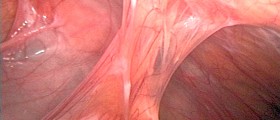
Abdominal distention or swelling of the abdomen is a common condition usually caused by over-eating. It is rather a symptom than a health condition. Many other conditions may be responsible from abdominal distention such as weight gain, pregnancy, premenstrual syndrome or simple swallowing of air. Abdominal distention frequently occurs due to gas in the intestines. The gas may form as a result of eating fibrous foods or beans, for example. Moreover, some people are intolerant to certain foods and their abdomen swells in a reaction with a substance that causes intolerance. For example, people intolerant to lactose will experience abdominal distention after consuming diary foods. In more severe cases, abdominal distention occurs as a result of fluid retention in the abdomen.
Frequent causes of abdominal distention
Abdominal distention occurs when the area between the ribcage and the pelvis is swollen and hard. The severity and duration of the swelling may indicate the underlying cause of distention. Most commonly the cause is one of the following: overeating, intestinal gas, irritable bowel syndrome, Crohn's disease, liver cirrhosis, hernia or an after-effect of surgical procedure.
Overeating refers to the consumption of the excess food, leading to bloating, weight gain and often obesity. Many people overeat during festivities or while on holiday.
Intestinal gas is another usual cause of distended stomach caused by swallowed air. This result in abdominal discomfort and the belching that expels the air and relieves the discomfort. This usually happens if people are gulping food or drink too rapidly. Anxiety and carbonated beverages may also contribute to intestinal gasses. Foods that cause intestinal gases are beans and lentils, dairy products, fructose and sorbitol.
Irritable bowel syndrome is a health condition that affects the large intestine causing abdominal cramping, bloating and a change in bowel habits.
Crohn's Disease is another disorder of the gastro intestinal tract, which causes inflammation. The disease may affect any area of gastro intestinal tract, but it is more common in the lower part of the small intestine, causing the swelling. The swelling can cause pain and can make the intestines empty frequently, resulting in diarrhea.
Liver Cirrhosis is a condition in which the liver slowly deteriorates and malfunctions due to chronic injury. Healthy liver cells gradually being replaced by scar tissue and the liver loses its normal functions so that the body starts swelling as a result of water retention. The late stage of liver cirrhosis is usually characterized by abdominal distention.
A hernia is the protrusion through the wall of the cavity that normally contains it. For example, when the soft tissues of the intestine are protruding out of the weaker sections of the abdominal wall, the tissue slip downwards causing a lump in the lower abdominal area.Surgery may also be one of the reasons of abdominal swelling, as it may sometimes lead to accumulation of fluids in the abdominal area. This usually happens when surgical procedure fails.
Self-help and prevention
To prevent abdominal bloating one should avoid carbonated beverages, avoid chewing gum or sucking on candies, avoid drinking through a straw, or sipping the surface of a hot beverage. If the malabsorption causes swelling, one should change the diet habits. For irritable bowel syndrome, one should increase dietary fiber, decrease emotional stress, and consult with the doctor.

















Your thoughts on this
Loading...